Here's why evevyone should download PressReader today: Hotspots.
PressReader HotSpots are WiFi locations that let you download newspapers off PressReader for FREE. And they are as common and common sense as your local library, for instance. The nearest one to me is the Burnaby Public Library Metrotown branch, and just to test it out, I downloaded today's Financial Post:
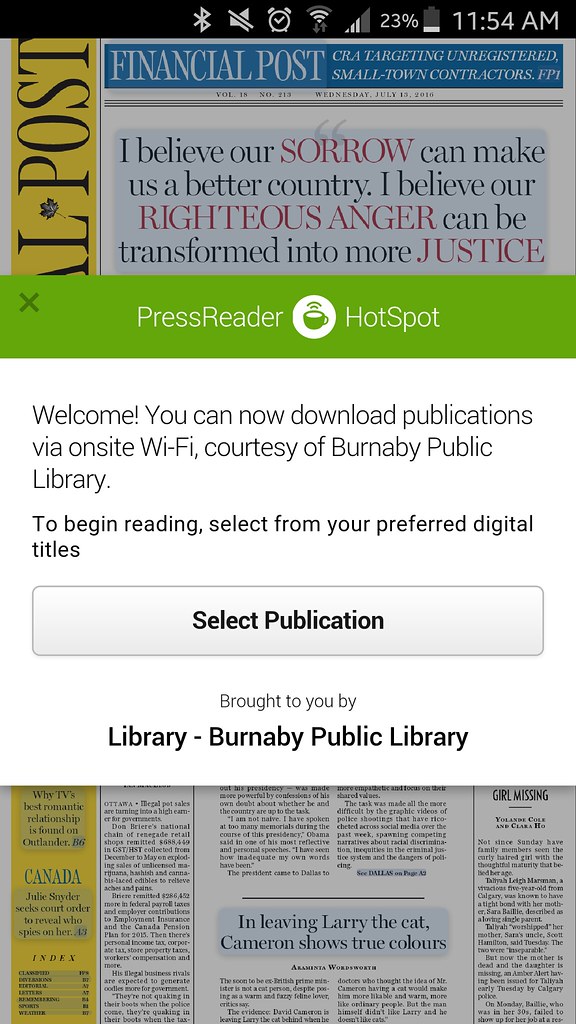
There's obviously more than the Financial Post, of course (there's over 5000 newspapers and magazines, in over 60 languages, from 100 countries). Whatever your culture you are likely able to find something relevant to you. Handy if the library doesn't normally carry it or if someone is hogging the only copy.
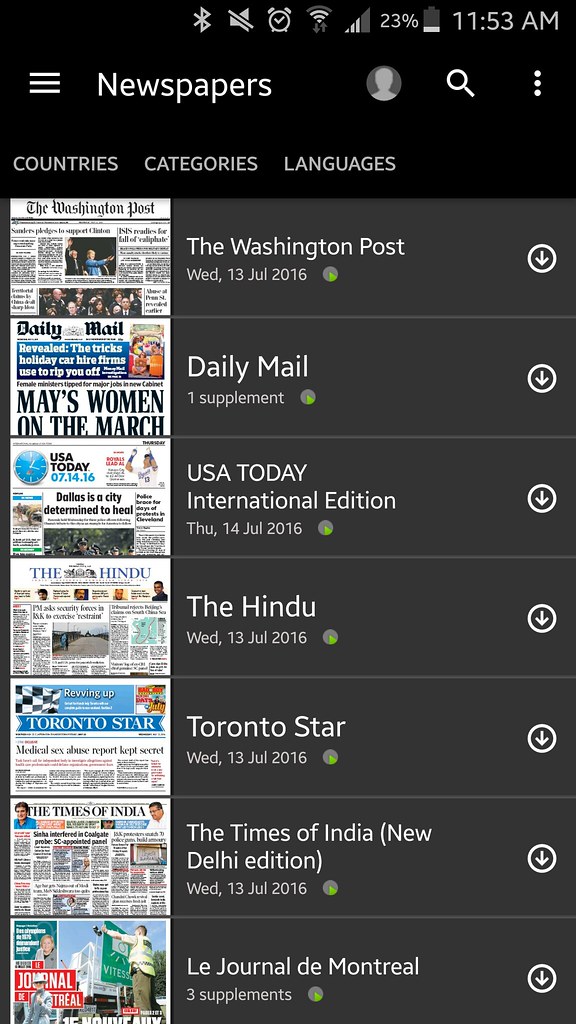
You can squint at the newspaper off your smartphone if you like, but there are other options. Keep reading...
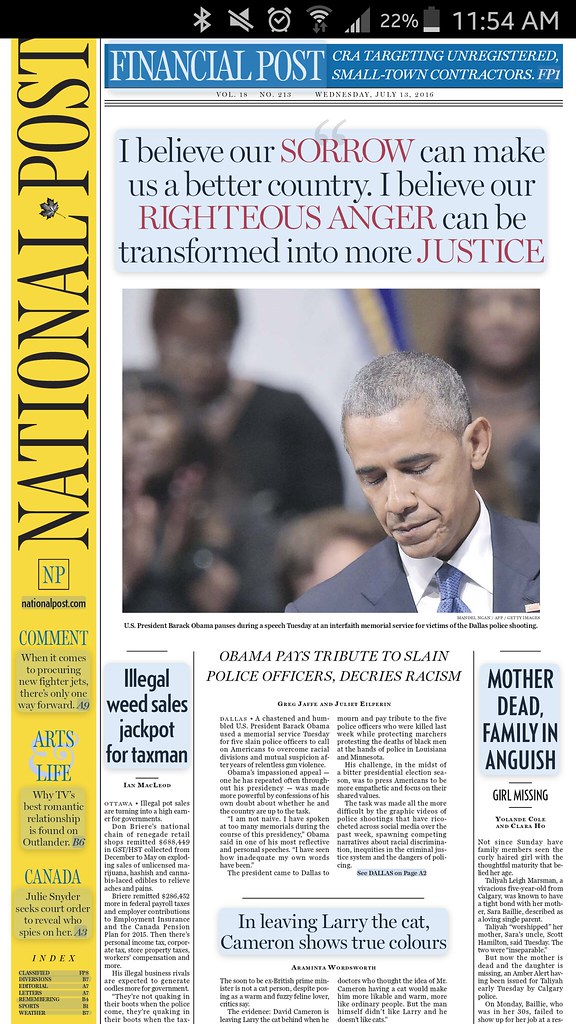
Press and hold on the article and you get a pop-up with various options, including to have the article read to you. Newsprint too squinty even on the the real hardcopy newspaper? Try the Listen option.
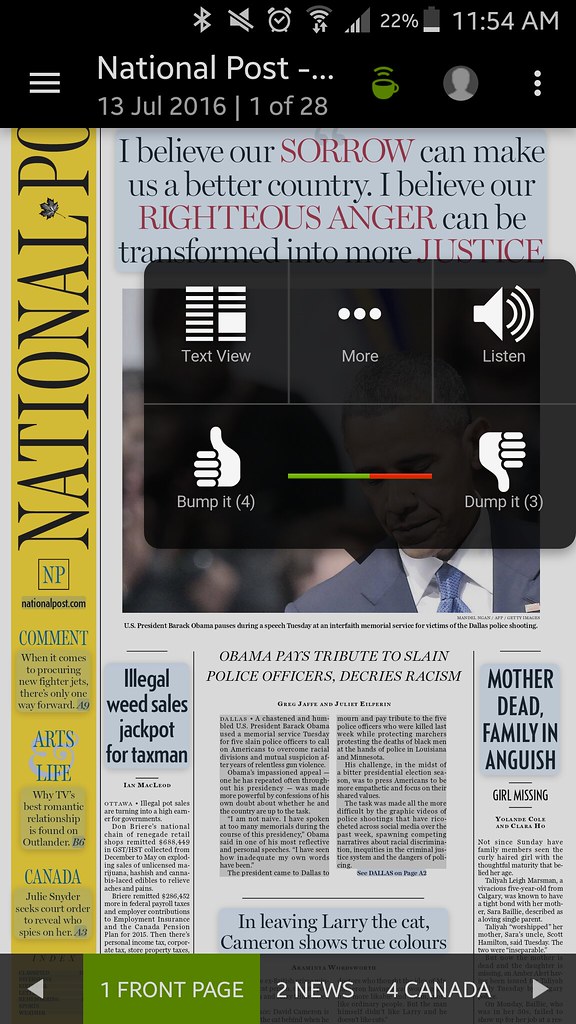
The text view not only lets you have larger and more legible text to read, but you can use the "More" options menu to copy the text. Handy for research and sharing, and a tough trick to pull off with a hardcopy paper.
Once you've downloaded a paper, you are free to leave the Hotspot and read it again off the copy in your smartphone. If you can get the WiFi signal from the library (for example), you could download what you need and go, without even setting foot in the library!
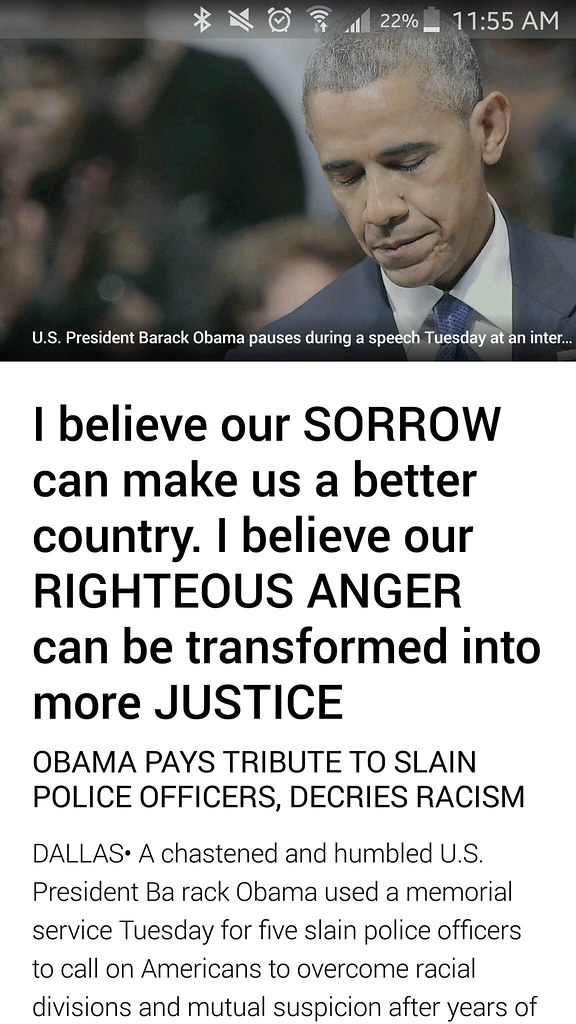
I believe our SORROW can make us a better country. I believe our RIGHTEOUS ANGER can be transformed into more JUSTICE
OBAMA PAYS TRIBUTE TO SLAIN POLICE OFFICERS, DECRIES RACISM
National Post - (Latest Edition)Greg Jaffe and Juliet Eilperin
DALLAS• A chastened and humbled U.S. President Ba rack Obama used a memorial service Tuesday for five slain police officers to call on Americans to overcome racial divisions and mutual suspicion after years of relentless gun violence.
Obama’s impassioned appeal — one he has repeated often throughout his presidency — was made more powerful by confessions of his own doubt about whether he and the country are up to the task.
“I am not naive. I have spoken at too many memorials during the course of this presidency,” Obama said in one of his most reflective and personal speeches. “I have seen how inadequate my own words have been.”
The president came to Dallas to mourn and pay tribute to the five police officers who were killed last week while protecting marchers protesting the deaths of black men at the hands of police in Louisiana and Minnesota.
His challenge, in the midst of a bitter presidential election season, was to press Americans to be more empathetic and focus on their shared values.
The task was made all the more difficult by the graphic videos of police shootings that have ricocheted across social media over the past week, spawning competing narratives about racial discrimination, inequities in the criminal justice system and the dangers of policing.
“Can we find the character, as Americans, to open our hearts to each other? Can we see in each other a common humanity and a shared dignity, and recognize how our different experiences have shaped us?” Obama asked. “I don’t know. I confess that sometimes I, too, experience doubt.”
Aboard Air Force One en route to Texas, Obama called family members of the two men killed by police in Louisiana and Minnesota to offer his and the first lady’s condolences.
In Dallas, the president praised police officers for doing difficult and dangerous work, even as he called attention to broader problems with policing practices across the nation. He consoled the mourners, even as he challenged Americans to be more open with each other, to shout less and listen more.
“If we’re honest, perhaps we’ve heard prejudice in our own heads and felt it in our own hearts. We know that,” Obama said. He acknowledged that even as Americans try to rise above bigotry and discrimination, “none of us is entirely innocent. No institution is entirely immune, and that includes our police departments. We know this.”
Obama’s speech was memorable for its raw quality and the president’s unmistakable frustration. The president was returning to a theme — the need to overcome rancorous partisanship and racial divisions — that has dominated his career.
One year ago, Obama stood before an arena full of mourners in Charleston, S.C., who had gathered to remember nine black parishioners killed by a white gunman during a Bible study. In Charleston, Obama gave a soaring, spiritual and optimistic address. The country, he said, had responded to the brutal killings with a “big-hearted generosity . . . a thoughtful introspection and self-examination that we so rarely see in public life.”
In Dallas, he again described a tragedy as a call to action, but this time he was more blunt than soaring. His optimism was tempered by a stream of violence in the intervening year. Since he spoke in Charleston, there have been more mass shootings: in Roseburg, Ore.; San Bernardino, Calif.; Orlando; and now Dallas. Much to his frustration, the president’s efforts to advance gun-control legislation have gone nowhere, and a bipartisan push for criminal justice reform has stalled. Racial tensions seem to have grown worse amid the recent run of police shootings and the divisive cacophony of a bitter election season.
Obama called on police and their supporters not to ignore the complaints of protesters who point to racial disparities in searches, arrests, deadly shootings and sentences as proof of police bias.
He called on protesters and civil rights activists to empathize with the plight of police officers, who are often assigned to patrol dangerous and forgotten neighbourhoods without sufficient resources.
“We flood communities with so many guns that it is easier for a teenager to buy a Glock than get his hands on a computer or even a book,” Obama said.
“It’s hard not to think sometimes that the centre won’t hold and that things might get worse. I understand how Americans are feeling ... we must reject such despair.”
PressReader HotSpots are WiFi locations that let you download newspapers off PressReader for FREE. And they are as common and common sense as your local library, for instance. The nearest one to me is the Burnaby Public Library Metrotown branch, and just to test it out, I downloaded today's Financial Post:

There's obviously more than the Financial Post, of course (there's over 5000 newspapers and magazines, in over 60 languages, from 100 countries). Whatever your culture you are likely able to find something relevant to you. Handy if the library doesn't normally carry it or if someone is hogging the only copy.

You can squint at the newspaper off your smartphone if you like, but there are other options. Keep reading...

Press and hold on the article and you get a pop-up with various options, including to have the article read to you. Newsprint too squinty even on the the real hardcopy newspaper? Try the Listen option.

The text view not only lets you have larger and more legible text to read, but you can use the "More" options menu to copy the text. Handy for research and sharing, and a tough trick to pull off with a hardcopy paper.
Once you've downloaded a paper, you are free to leave the Hotspot and read it again off the copy in your smartphone. If you can get the WiFi signal from the library (for example), you could download what you need and go, without even setting foot in the library!

I believe our SORROW can make us a better country. I believe our RIGHTEOUS ANGER can be transformed into more JUSTICE
OBAMA PAYS TRIBUTE TO SLAIN POLICE OFFICERS, DECRIES RACISM
National Post - (Latest Edition)Greg Jaffe and Juliet Eilperin
DALLAS• A chastened and humbled U.S. President Ba rack Obama used a memorial service Tuesday for five slain police officers to call on Americans to overcome racial divisions and mutual suspicion after years of relentless gun violence.
Obama’s impassioned appeal — one he has repeated often throughout his presidency — was made more powerful by confessions of his own doubt about whether he and the country are up to the task.
“I am not naive. I have spoken at too many memorials during the course of this presidency,” Obama said in one of his most reflective and personal speeches. “I have seen how inadequate my own words have been.”
The president came to Dallas to mourn and pay tribute to the five police officers who were killed last week while protecting marchers protesting the deaths of black men at the hands of police in Louisiana and Minnesota.
His challenge, in the midst of a bitter presidential election season, was to press Americans to be more empathetic and focus on their shared values.
The task was made all the more difficult by the graphic videos of police shootings that have ricocheted across social media over the past week, spawning competing narratives about racial discrimination, inequities in the criminal justice system and the dangers of policing.
“Can we find the character, as Americans, to open our hearts to each other? Can we see in each other a common humanity and a shared dignity, and recognize how our different experiences have shaped us?” Obama asked. “I don’t know. I confess that sometimes I, too, experience doubt.”
Aboard Air Force One en route to Texas, Obama called family members of the two men killed by police in Louisiana and Minnesota to offer his and the first lady’s condolences.
In Dallas, the president praised police officers for doing difficult and dangerous work, even as he called attention to broader problems with policing practices across the nation. He consoled the mourners, even as he challenged Americans to be more open with each other, to shout less and listen more.
“If we’re honest, perhaps we’ve heard prejudice in our own heads and felt it in our own hearts. We know that,” Obama said. He acknowledged that even as Americans try to rise above bigotry and discrimination, “none of us is entirely innocent. No institution is entirely immune, and that includes our police departments. We know this.”
Obama’s speech was memorable for its raw quality and the president’s unmistakable frustration. The president was returning to a theme — the need to overcome rancorous partisanship and racial divisions — that has dominated his career.
One year ago, Obama stood before an arena full of mourners in Charleston, S.C., who had gathered to remember nine black parishioners killed by a white gunman during a Bible study. In Charleston, Obama gave a soaring, spiritual and optimistic address. The country, he said, had responded to the brutal killings with a “big-hearted generosity . . . a thoughtful introspection and self-examination that we so rarely see in public life.”
In Dallas, he again described a tragedy as a call to action, but this time he was more blunt than soaring. His optimism was tempered by a stream of violence in the intervening year. Since he spoke in Charleston, there have been more mass shootings: in Roseburg, Ore.; San Bernardino, Calif.; Orlando; and now Dallas. Much to his frustration, the president’s efforts to advance gun-control legislation have gone nowhere, and a bipartisan push for criminal justice reform has stalled. Racial tensions seem to have grown worse amid the recent run of police shootings and the divisive cacophony of a bitter election season.
Obama called on police and their supporters not to ignore the complaints of protesters who point to racial disparities in searches, arrests, deadly shootings and sentences as proof of police bias.
He called on protesters and civil rights activists to empathize with the plight of police officers, who are often assigned to patrol dangerous and forgotten neighbourhoods without sufficient resources.
“We flood communities with so many guns that it is easier for a teenager to buy a Glock than get his hands on a computer or even a book,” Obama said.
“It’s hard not to think sometimes that the centre won’t hold and that things might get worse. I understand how Americans are feeling ... we must reject such despair.”
Comments
Post a Comment